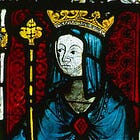My fiction writing is for my members only (although you can read the first 25% free as a taster). The beauty of this period, for fiction writers, is that the surviving written record is so tiny that we can create these stories suggesting what their lives might have been like. To access this content (and unlock all my fiction writing), you can subscribe below.
Historical Preface
Bede, in his Ecclesiastical History, made reference to a group of women who travelled to continental Europe from the Anglo-Saxon kingdoms in England:
At that time, because there were not yet many monasteries founded in England, numbers of people from Britain used to enter the monasteries of the Franks or Gauls to practise the monastic life; they also sent their daughters to be taught in them and to be wedded to the heavenly bridegroom. They mostly went to the monasteries at Brie, Chelles, and Andelys-sur-Seine.1
I always find the language used here very striking: ‘they also sent their daughters…’. The word ‘sent’ sounds so enforced, as if the women were totally excluded from the plans being made for their lives.
Who were these women? What did they think about being ‘sent’ abroad?
I’ve used this as inspiration for a new three-part miniseries exploring, through fiction, what their experience might have been. We will, of course, never know for sure as there just aren’t the sources to hear their own voices. But I hope I’ve done their dignity justice through using my words to uncover their (potential) lives.
It can be hard to know, when deep in the trenches of youthful, flightful whimsy, what is best for one’s life. So full of passion, armed with a new sense of ourselves as no longer children, having crossed the threshold into young adulthood, we make heartfelt pleas yet find ourselves, more often than not, desperately disappointed.
Naturally, what we think is best shifts with age and wisdom, so that by the closing of one’s time here we can look back over the journey of our years and know, deep down, that what happened was always meant to be that way.
It had always been the plan, though not always my plan.
And I had used it my advantage, in a world determined to wrestle control from those like me.
This is my story, with all its ups and downs. All its loves and losses. And its greatest surprise.
It had been icy cold on the day I’d first noticed him.
Puddles had turned to glass, cracking underfoot, and the air had a hazy quality to it, though it was a bright and clear day. Our cheeks, difficult to hide beneath warm woollen layers, took on a rosy hue as we walked to the little chapel nestled within the village. It was one of the few stone buildings adorning the landscape around us, a simple rectangular shell hiding the beautifully crafted columns and alcoves inside.
It would be fair to say that we enjoyed the socialising more than the singing, and definitely more than the sermons. Chapel was something we endured, the Latin drone of the priest wearying even the most saintly of congregants. Though speaking during the meeting was strictly forbidden, I would find myself catching the eye of friends throughout, saying all we needed to without uttering a single word.
Eadric and I had grown up together, in the way that children living in the same village often did: talking briefly from time to time, playing the odd game, and getting sent on errands by our mothers.
But there was something different about him that morning. Perhaps the cold had altered his complexion a little, or sleep had styled his hair unusually. Whatever it was, I found myself studying Eadric intently as the priest exhorted us to prayer and praise, in a way that I hadn’t done before.
He’d handed me a posy of flowers a few months later, catching my hand as I walked through the village. The warmth I felt in his company had become a familiar feeling by then, and I was beginning to recognise it as attraction. I thought it odd, that someone who had gone unnoticed for so many years was suddenly prompting my heart to pound, but I didn’t fight it.
I didn’t fight it at all.
In fact, when he’d kissed me at the harvest celebrations the year I’d turned seventeen, I’d found myself dreaming of a future together. That’s what happens when couples fall in love, right? In my naivety, I’d laid out every step of our lives from that moment onwards, the little chapel where our spark had been kindled playing host to our wedding, our children’s baptisms, and eventually our funerals.
That our paths might, one day, diverge had never crossed my mind.
So when he’d asked for my hand in marriage, I’d accepted without a moment’s thought. It had made complete sense to me that we would ask for God’s blessing upon the union we had already forged with our bodies.
And it had never occurred to me that my father might object.
He’d almost laughed. “Absolutely not.” I must have looked blankly at him because he’d elaborated. “It’s out of the question. You’re not marrying, and you’re certainly not marrying him.”
“What do you mean I’m not marrying?” His statement had hit me like a bolt from the blue. Having seen each of my three sisters married, why would my father have something different planned for me? “And what do you mean not him?”








